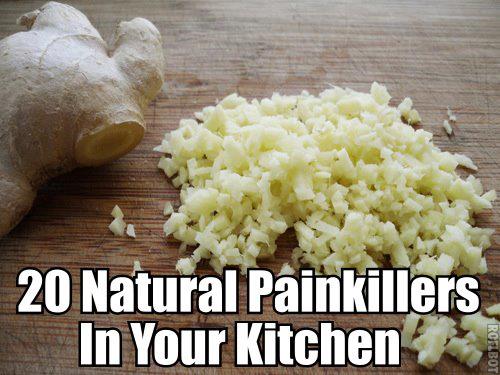Note – as always – this is just background information, not medical advice or a recommendation to self-medicate. Pain may be an indicator of more serious issues and so if you have symptoms, medical consultation is advised. Also, be sure to ask your physician if there are any known interactions between herbs and medications you are taking.
Just discovered a fantastic, fascinating list of natural painkillers that are common kitchen ingredients! What’s interesting is that the list is not just a basic list – but also gives specific information as to the type of pain that researchers have found that these natural ingredients may assist with – and the way in which the food is used (not all of the remedies involve actually eating the herb / food in question!)
This list is absolutely incredible – and the uses are based on reports from scientific research (this info is included at the source article – link at the foot of my commentary). The original list is a bit of a long read though, requiring much scrolling – and so we thought it might be good to seem them all “at a glance” – so for those who want to “skim” through the list really quickly, I made a “short version” of the top 20, together with a summary of the condition each item is used for.
Once again, the miracles of nature have astounded me and made me wonder if the modern world will tamper with everything before going full circle and realizing that “natural is best” after all! Thankfully there are still many good scientists doing groundbreaking work in this field and I take my hat off to you.
Top 20 Natural Painkillers List
Ginger (add to 1-2 teaspoons daily to diet for general muscle pain)
Cloves (chewed gently for toothache / gum inflammation)
Apple Cider Vinegar (1tbsp mixed with water before meals for heartburn)
Garlic (made into a special oil for earache – recipe at the original article)
Cherries (joint pain, headaches – 1 bowl per day)
Oily fish (Salmon, tuna, sardines, trout, mackerel, herring – intestinal inflammation – 18oz per week)
Yogurt (PMS – 2 cups per day)
Turmeric (chronic pain – 1/4 teaspoon per day)
Oats (endometrial pain – they are gluten free)
Salt (hot, salty foot baths for ingrown toenails – 1tsp per cup of water – 20 mins twice daily)
Pineapple (stomach bloating, gas – 1 cup of fresh pineapple)
Peppermint (add a few drops of the essential oil to bath for sore muscles)
Grapes (back pain – 1 heaping cup per day)
Water (general injury pain, helps wash away the pain-triggering histamine – 8 x 8 ounce glasses per day)
Horseradish (sinus pain – 1 teaspoon twice daily)
Blueberries (bladder / urinary tract infections – 1 cup daily)
Raw Honey (topical application 4 times daily for cold sores / canker sores) (see also our special report on raw honey)
Flax (breast pain – 3 tablespoons daily – must be ground or seeds will pass right through!)
Coffee (migraines – caffeine stimulates the stomach to absorb pain meds better)
Tomato Juice (leg cramps – tomato juice is rich in potassium – 10oz daily)
Can you think of any more? Let us know in the comments.
Source: herbs-info.com

EmoticonEmoticon